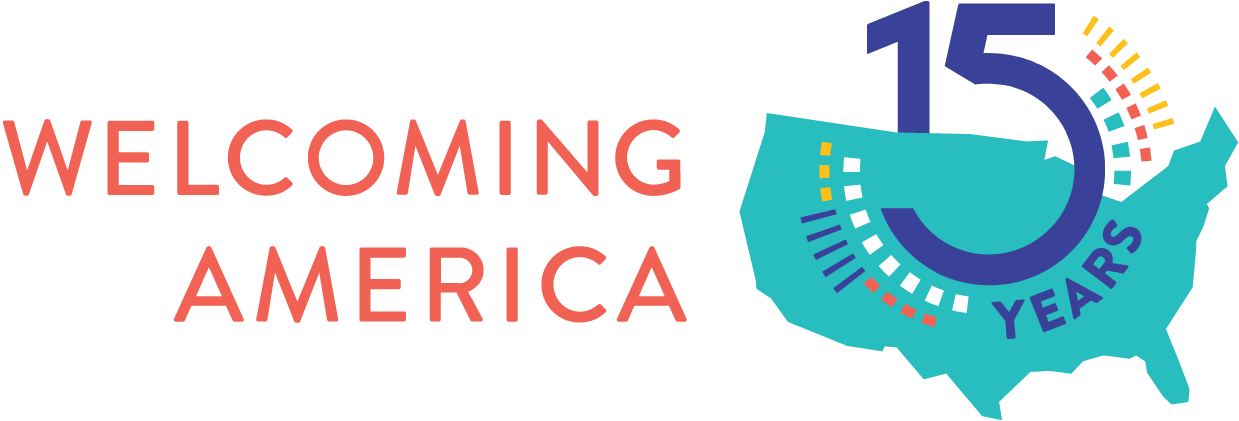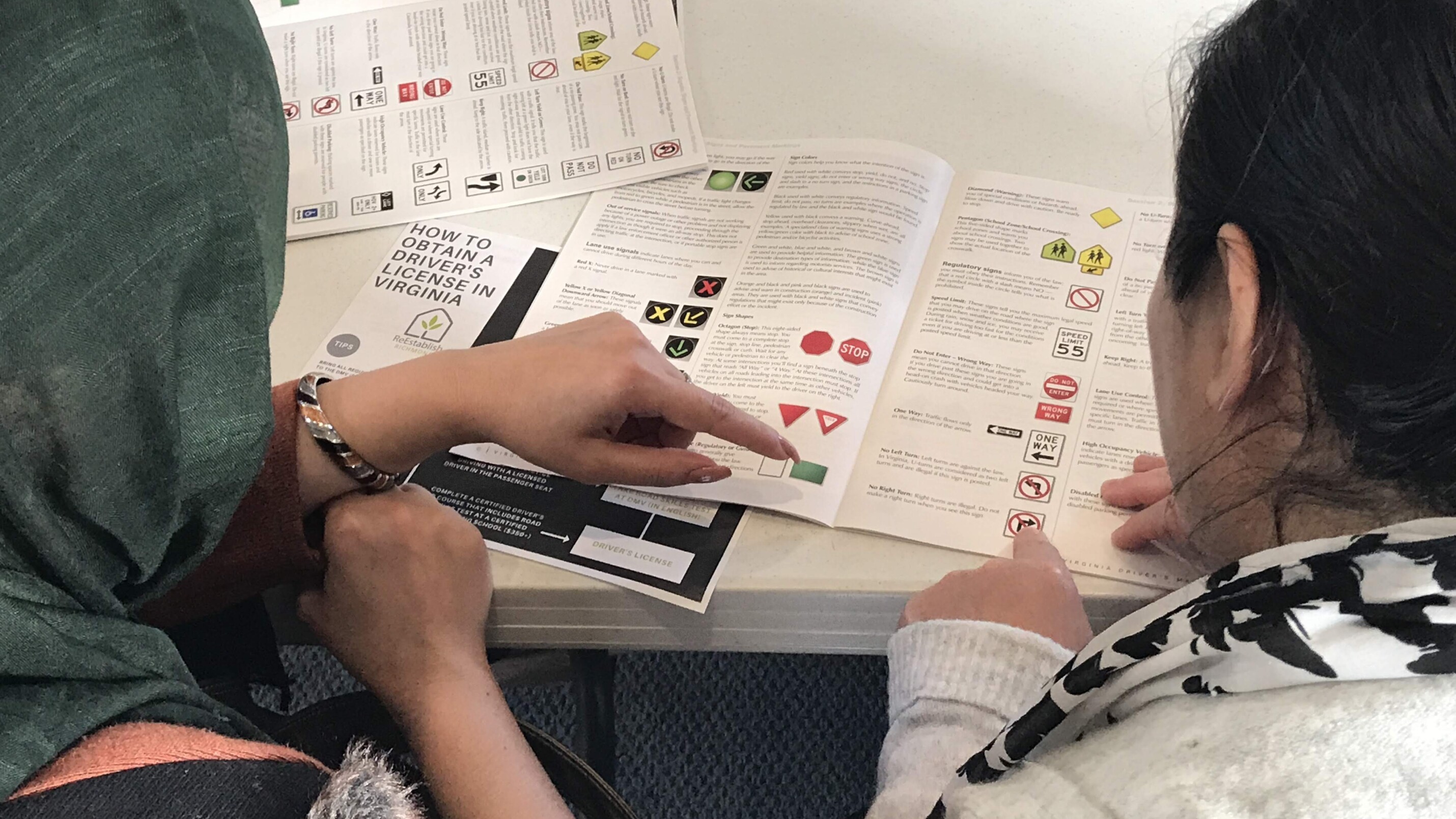
From Afghanistan to Virginia: How Richmond welcomes refugees
In 2016, a group of 30 Afghan women arrived at their local DMV office in Richmond, Virginia to take the learner’s permit test. When they arrived from Afghanistan a few years before, they didn’t know how to get a driver’s license and could not find information in their language.
Kate Ayers, executive director of ReEstablish Richmond, first met this group of women when she arrived at a client’s home to provide an orientation about the local bus system. The client told her about the group’s aspiration to become more independent by learning how to drive.
Inspired by the women’s goal, Kate developed a curriculum based on the Virginia driver’s manual that explained the rules of safe driving in plain terms. One of the women in the group spoke fluent English and offered to be the class interpreter. The client and her husband agreed to host the class at their apartment, where the group of Afghan women gathered for several weeks to study the driver’s manual and learn the basics of driving.
Equipped with the knowledge they learned, and with ReEstablish Richmond’s help addressing barriers to language access — such as hiring an interpreter to assist with the written test, which wasn’t available in the Dari or Pashto languages at the time — nearly all of the women passed the test on their first try.
“It established ReEstablish Richmond as an organization that helps especially Afghan women to get a driver’s license,” Kate says.
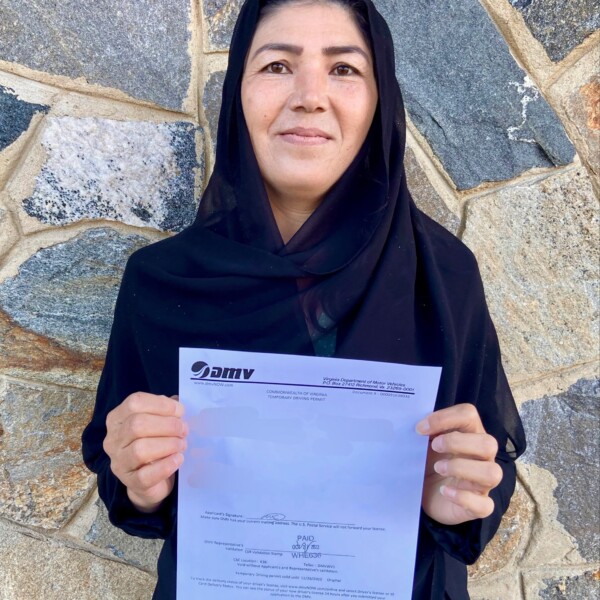
A client from Afghanistan with her learner’s permit. Photo courtesy of ReEstablish Richmond
Over the years, ReEstablish Richmond has equipped more than 1,000 newcomers with lessons and study materials on the rules of the road in preparation for their driver’s tests. The program has become even more robust since hiring Naseeb Ullah Safi in 2023 — the husband of the client who hosted Kate’s first driver’s class over seven years ago.
Naseeb serves as coordinator of transportation independence at ReEstablish Richmond. He helps clients understand the process of getting a driver’s license, connects them to study materials in their primary language, assists them in navigating the DMV, and coordinates volunteers and certified driving schools that provide practical driving skills support in preparation for the driver’s test.
“When I first arrived to the U.S. in 2014, ReEstablish Richmond was thinking of different ways that they can support refugees to establish roots here in Richmond and be self-sufficient,” he says. Naseeb shares that many Afghan women “never thought that they would be able to drive here, be independent, and support their families in that way.”
Responding to the growing Afghan community
Having an organization like ReEstablish Richmond, which has the skills and resources to work with the Afghan community, has been critical for the Richmond community in the last two years.
Since the Taliban’s siege of Kabul, Afghanistan in August 2021, more than 115,000 Afghan evacuees have sought safety in the United States, with over 6,000 arriving in Virginia. According to Kate, over 1,000 newcomers have arrived in Richmond since 2021, the majority of whom have been Afghan refugees.
“When the evacuation happened, our clients who were already resettled in Richmond reached out to us in droves about their personal trauma and their worries about their family members,” Kate reflects.
ReEstablish Richmond quickly began working in collaboration with staff, volunteers, and community partners to welcome the newly arrived Afghan evacuees and support the Afghan community members already living in Richmond. To support their work, ReEstablish Richmond joined a cohort of Welcoming Network members in a learning community facilitated by Welcoming America and the American Immigration Council.
This helped ReEstablish Richmond respond to the large number of new refugees and build capacity for welcoming initiatives. For one, the nonprofit established community-based English classes in partnership with ICNA Relief and the YMCA of Greater Richmond. The partners identified the Tuckahoe YMCA as a place where newcomers were already gathering on their own.
“During the day, it looks like your typical YMCA; people go for yoga, swim lessons, and more,” says Lisa Ramirez, senior vice president of community impact at the YMCA of Greater Richmond. “But in the evening, that YMCA turned into this neighborhood hub where we would have the vast community of our neighbors that were new immigrants. As we realized that we became a center for them, we started trying to figure out how we can provide programs and services for them.”
The team began hosting English classes there to make them accessible to as many people as possible. Hosting classes in the community, where newcomers were already comfortable, was one of the strengths of their approach.
To enhance language access even further, ReEstablish Richmond hired three Afghan program specialists — including Naseeb — to serve as linguistic and cultural liaisons to the growing Afghan community.
Increasing independence and driver’s safety
Safe driving is an important skill for newcomers to be able to navigate their community and access the resources they need, from food to healthcare to education and more.
Driver’s licenses for immigrants and refugees have recently become a newsworthy policy in the national narrative around immigration. While some states like Florida are voiding out-of-state licenses for undocumented immigrants, other states like Michigan are seeing more advocates calling for increased access for everyone to earn a driver’s license, regardless of immigration status.
ReEstablish Richmond’s transportation independence program is an important model for communities that want to be supportive of newcomers’ inclusion in all aspects of American life.
“People are realizing that we can help them with getting their driver’s license the proper way,” Naseeb shares. “It’s very important, not only for the clients to be safe drivers, but for their families and the rest of the drivers on the road.”
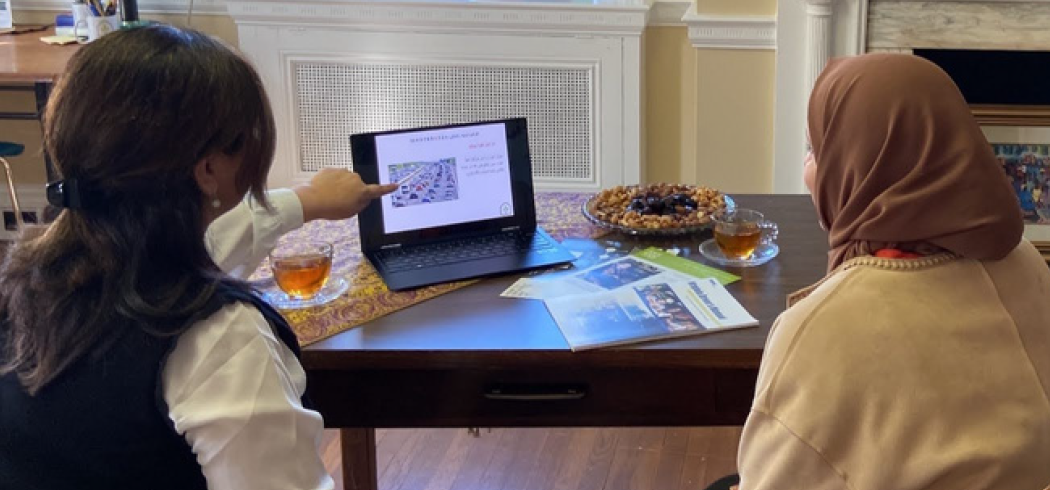
A client participates in a Driving in Virginia Workshop. Photo courtesy of ReEstablish Richmond
“Richmond doesn’t have really strong public transit,” Kate emphasizes. “Transportation barriers are the number one reason why people aren’t accessing the resources that are in the community.”
ReEstablish Richmond’s advocacy between 2015-2016 encouraged the state of Virginia to offer the driver’s test in more languages; the exam is now available in 26 languages, including Dari and Pashto. Thanks to their efforts, more people have access to the learner’s permit test.
Still more work needs to be done to support newcomer drivers; the Virginia driver’s manual and practice questions are currently only available in English and Spanish. ReEstablish Richmond continues to advocate for more accessible written materials at the DMV. In 2021, they released a report exposing the harms of language inequity for newcomers who are learning to drive.
Engaging the community in welcoming refugees
The work to welcome Afghan refugees to Richmond requires a full system of volunteers and social needs navigators to build connections between neighbors and new Afghan community members. ReEstablish Richmond relies on a robust volunteer network to support refugees’ wellness, economic empowerment, language learning, and sense of belonging during and after resettlement.
“We pair people with volunteers in the community that are goal-oriented, so it could be English language learning or connection to social services or whatever the client decides their goal is,” explains Kate.
The organization is using several strategies to recruit volunteers. Having a booth at community events is one way ReEstablish Richmond makes its volunteer opportunities known. “I [also] go and teach people about refugees and immigrants and their experiences, what is needed, and what things look like here in Richmond, and that often brings volunteers,” Kate says.
The media has also increased the community’s awareness of refugees’ needs. After the news broke about Afghan evacuees arriving in Richmond, the organization noticed that more community members were eager to volunteer their time, skills, and resources to support the newcomers. As a result, ReEstablish Richmond was able to match 104 clients with trained volunteers in 2022 to meet their goals.
The YMCA in Richmond is also rallying volunteers who can contribute to the most significant needs they’re seeing in their community.
“We’re working with more and more volunteers to help us with English as a second language. There are classes everywhere in our community, but all the classes are full,” Lisa shares. “We have people in the community coming to us and saying, ‘I can do conversational Spanish,’ or ‘I could do something to help them become familiar with basic English language pieces.'”
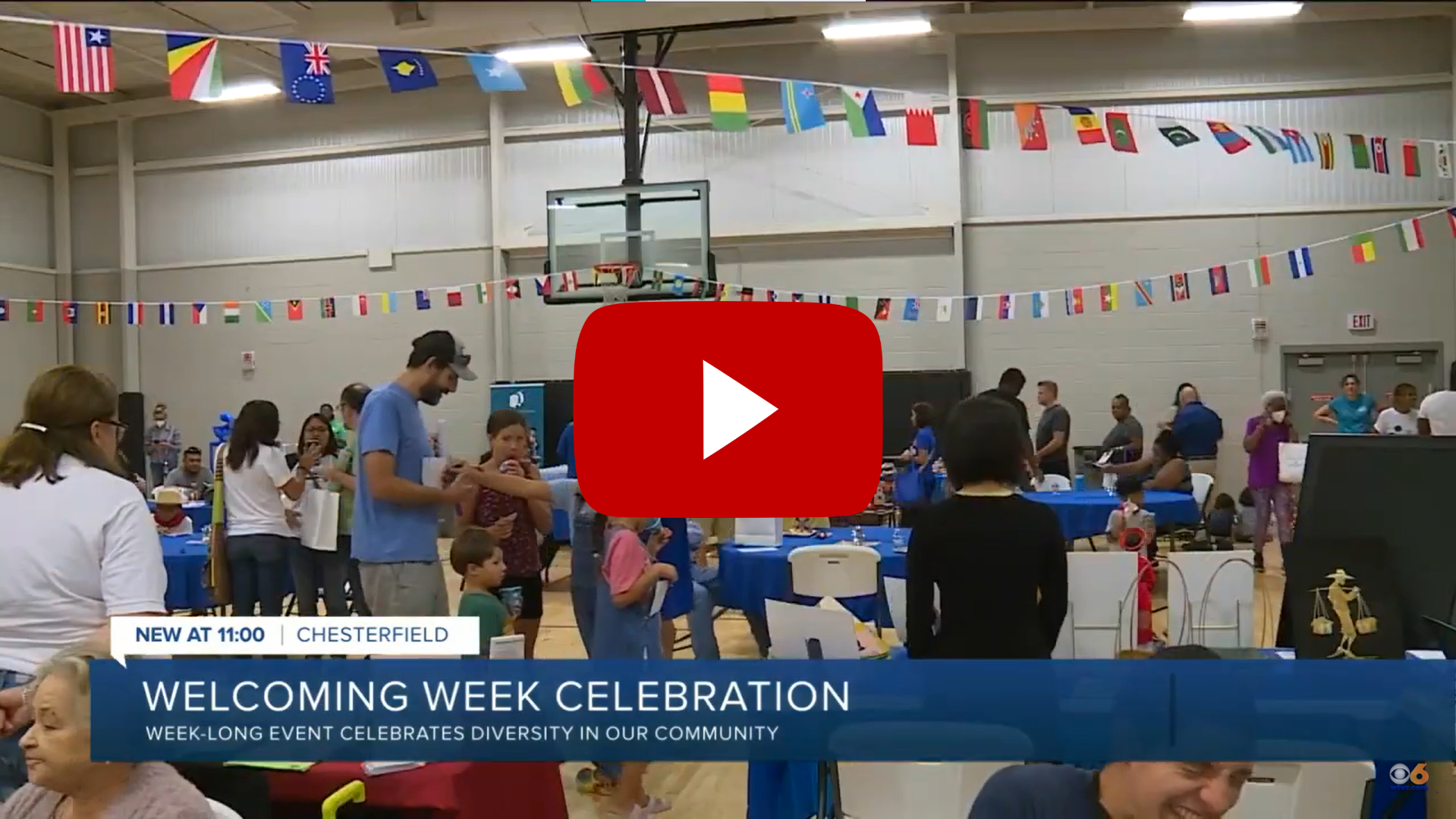
Welcoming Week events hosted by the YMCA of Greater Richmond are a collaborative effort, organized and run by volunteers alongside YMCA staff.
Going deeper, social needs navigators — people who facilitate connections to community resources — are key players in ensuring that refugees can access the services they need. The YMCA of Greater Richmond, in partnership with the City of Richmond, created a free, multilingual directory called Help1RVA. The program’s social needs navigators connect with Help1RVA clients within 48 hours to direct them to the appropriate resources.
“What we’re trying to do is move people from crisis to thriving,” Lisa explains. “Our navigators can follow through with the person who sought service and ask if they were able to connect.”
Engaging navigators and volunteers to act as guides adds a human element to what can be an overwhelming experience for refugees navigating a new community. The opportunity for connection has many benefits, including enhancing the wellness of newcomers and strengthening partnerships between organizations like the YMCA and ReEstablish Richmond.
Reflecting on the importance of partners, allies, and advocates in welcoming newcomers, Kate says, “I think it comes down to getting to know your community, not having preconceived notions about who should or could do the work, and being open and welcoming to everyone.”
